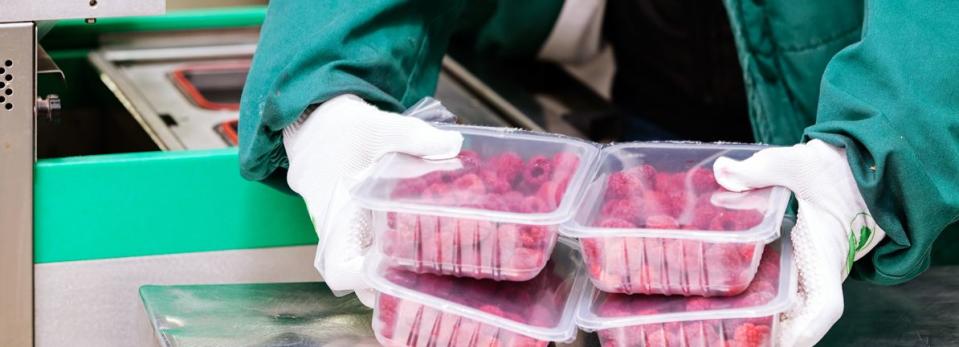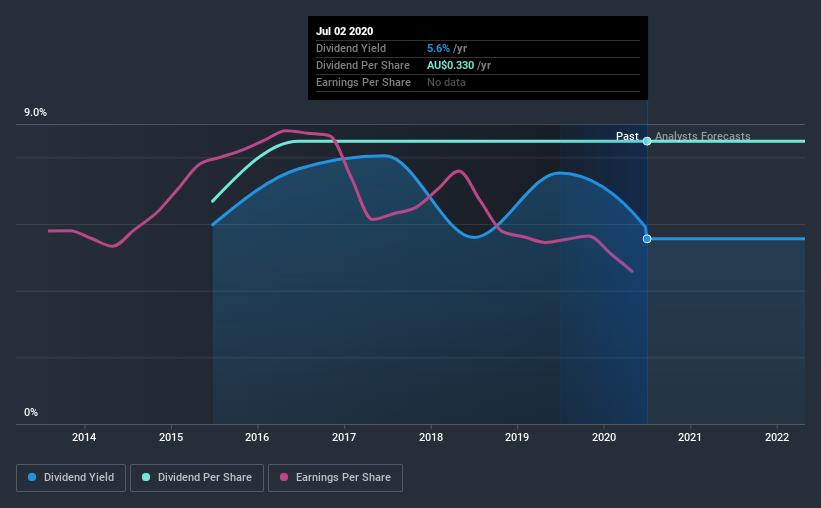Ricegrowers Limited (ASX:SGLLV) Goes Ex-Dividend Soon

Ricegrowers Limited (ASX:SGLLV) is about to trade ex-dividend in the next 4 days. This means that investors who purchase shares on or after the 7th of July will not receive the dividend, which will be paid on the 30th of July.
Ricegrowers's next dividend payment will be AU$0.33 per share. Last year, in total, the company distributed AU$0.33 to shareholders. Calculating the last year's worth of payments shows that Ricegrowers has a trailing yield of 5.6% on the current share price of A$5.94. We love seeing companies pay a dividend, but it's also important to be sure that laying the golden eggs isn't going to kill our golden goose! That's why we should always check whether the dividend payments appear sustainable, and if the company is growing.
See our latest analysis for Ricegrowers
Dividends are usually paid out of company profits, so if a company pays out more than it earned then its dividend is usually at greater risk of being cut. Ricegrowers is paying out an acceptable 72% of its profit, a common payout level among most companies. That said, even highly profitable companies sometimes might not generate enough cash to pay the dividend, which is why we should always check if the dividend is covered by cash flow. It paid out 24% of its free cash flow as dividends last year, which is conservatively low.
It's encouraging to see that the dividend is covered by both profit and cash flow. This generally suggests the dividend is sustainable, as long as earnings don't drop precipitously.
Click here to see how much of its profit Ricegrowers paid out over the last 12 months.
Have Earnings And Dividends Been Growing?
Businesses with shrinking earnings are tricky from a dividend perspective. If earnings decline and the company is forced to cut its dividend, investors could watch the value of their investment go up in smoke. Readers will understand then, why we're concerned to see Ricegrowers's earnings per share have dropped 10% a year over the past five years. Such a sharp decline casts doubt on the future sustainability of the dividend.
Many investors will assess a company's dividend performance by evaluating how much the dividend payments have changed over time. In the past five years, Ricegrowers has increased its dividend at approximately 4.9% a year on average. Growing the dividend payout ratio while earnings are declining can deliver nice returns for a while, but it's always worth checking for when the company can't increase the payout ratio any more - because then the music stops.
To Sum It Up
Should investors buy Ricegrowers for the upcoming dividend? We're not enthused by the declining earnings per share, although at least the company's payout ratio is within a reasonable range, meaning it may not be at imminent risk of a dividend cut. While it does have some good things going for it, we're a bit ambivalent and it would take more to convince us of Ricegrowers's dividend merits.
However if you're still interested in Ricegrowers as a potential investment, you should definitely consider some of the risks involved with Ricegrowers. Every company has risks, and we've spotted 2 warning signs for Ricegrowers you should know about.
We wouldn't recommend just buying the first dividend stock you see, though. Here's a list of interesting dividend stocks with a greater than 2% yield and an upcoming dividend.
This article by Simply Wall St is general in nature. It does not constitute a recommendation to buy or sell any stock, and does not take account of your objectives, or your financial situation. We aim to bring you long-term focused analysis driven by fundamental data. Note that our analysis may not factor in the latest price-sensitive company announcements or qualitative material. Simply Wall St has no position in any stocks mentioned.
Have feedback on this article? Concerned about the content? Get in touch with us directly. Alternatively, email editorial-team@simplywallst.com.

 Yahoo Finance
Yahoo Finance 
